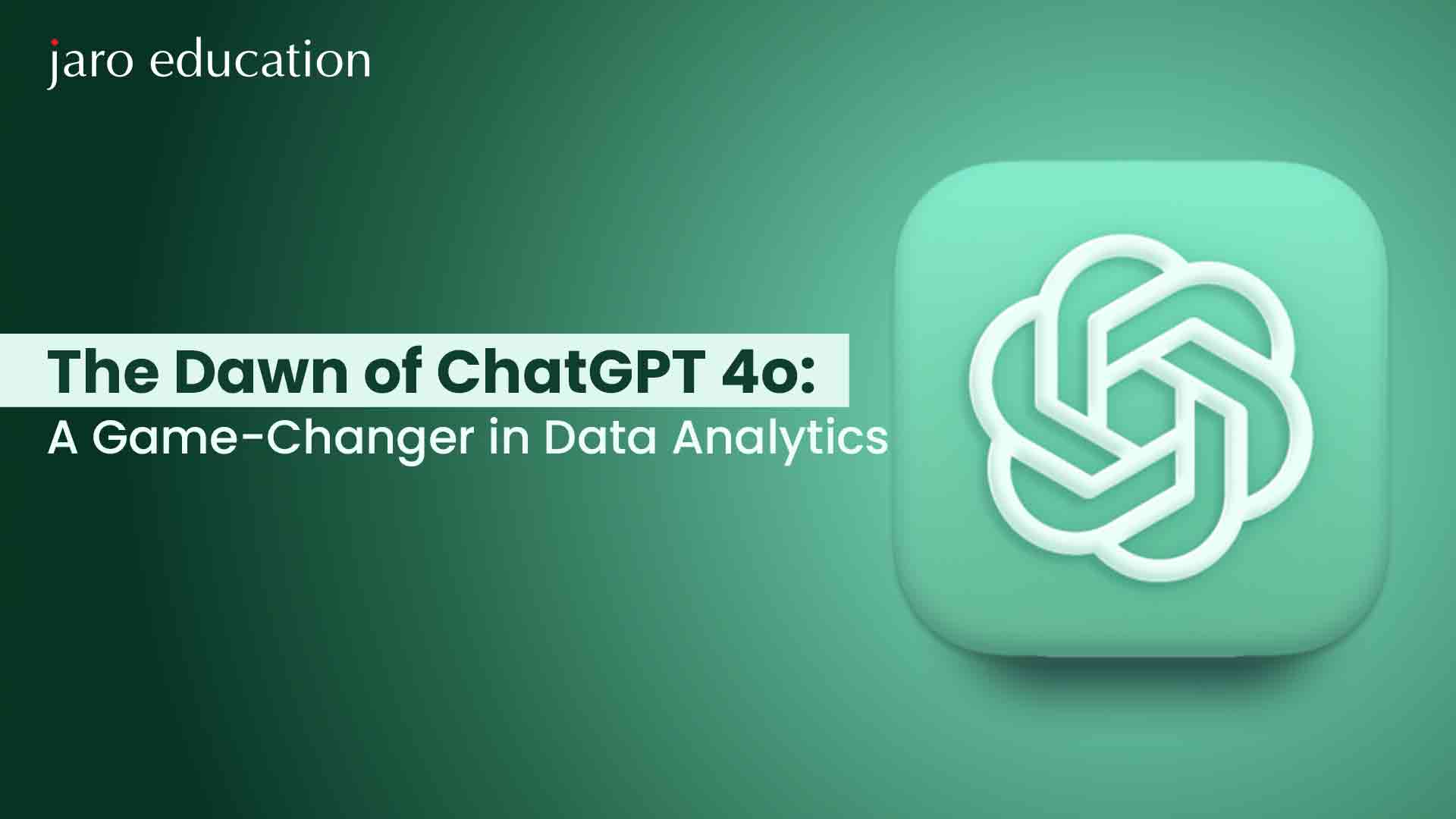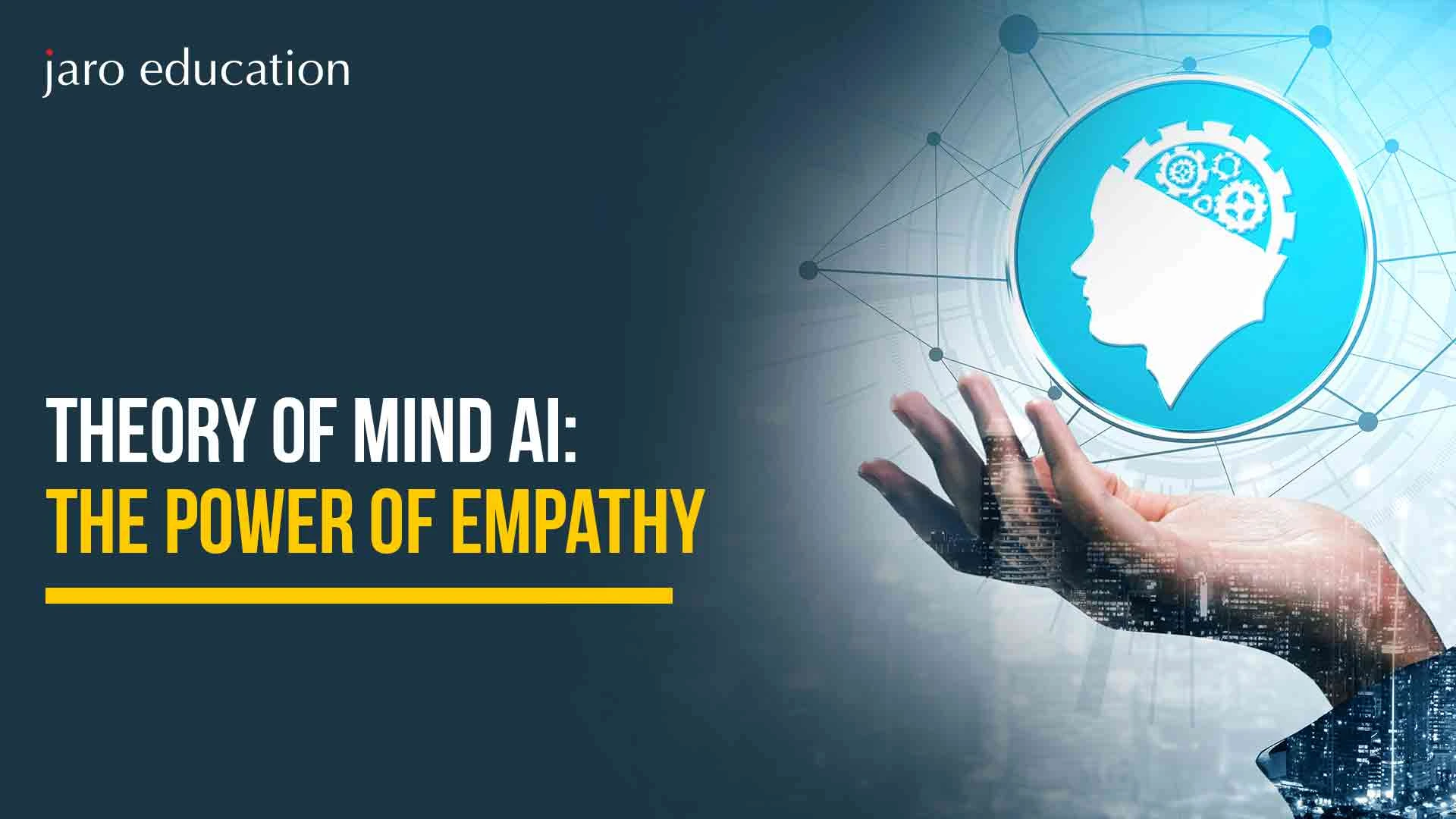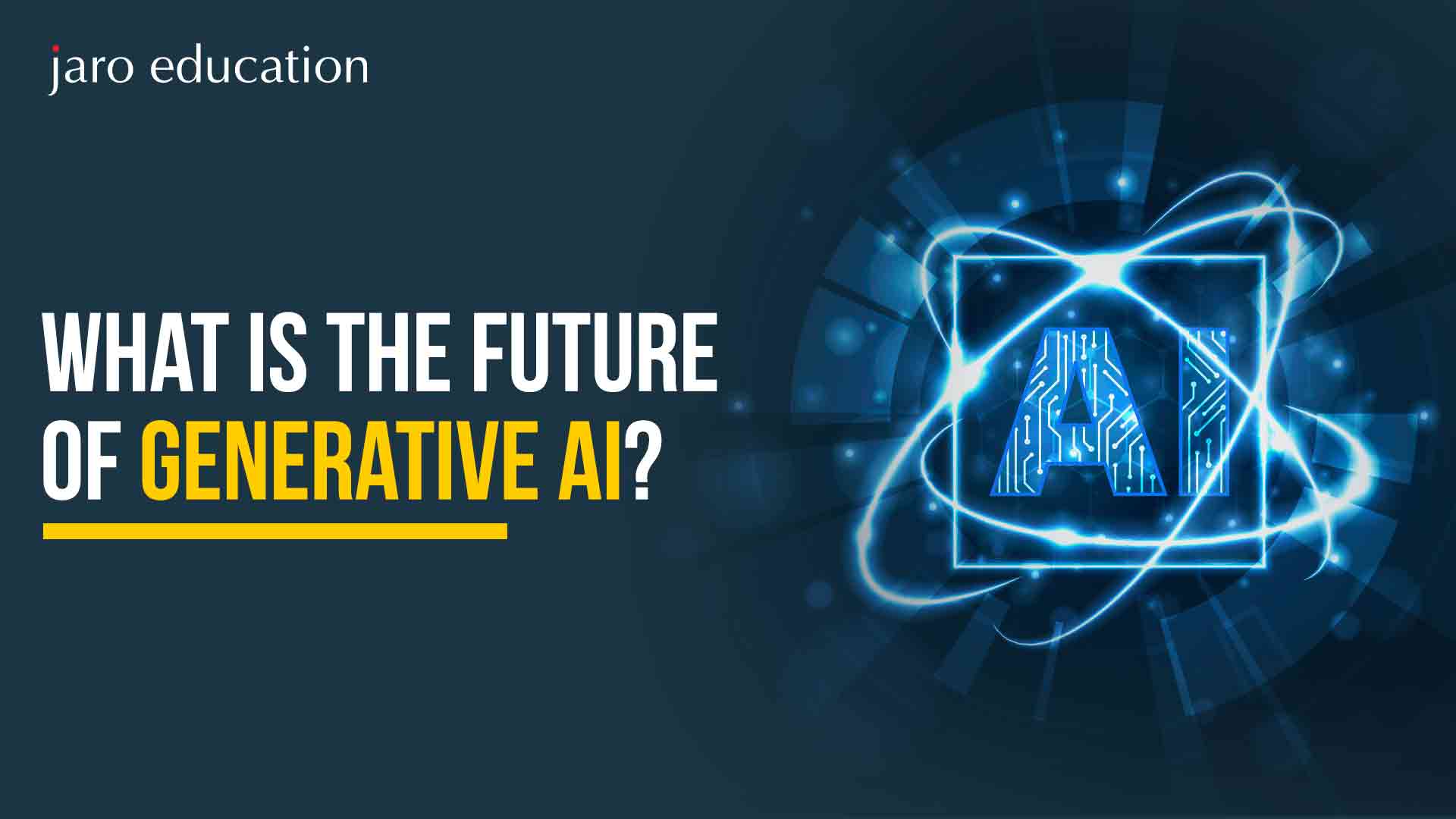Beyond the Hype: Practical Applications of AI in Healthcare 5.0
Table of Contents
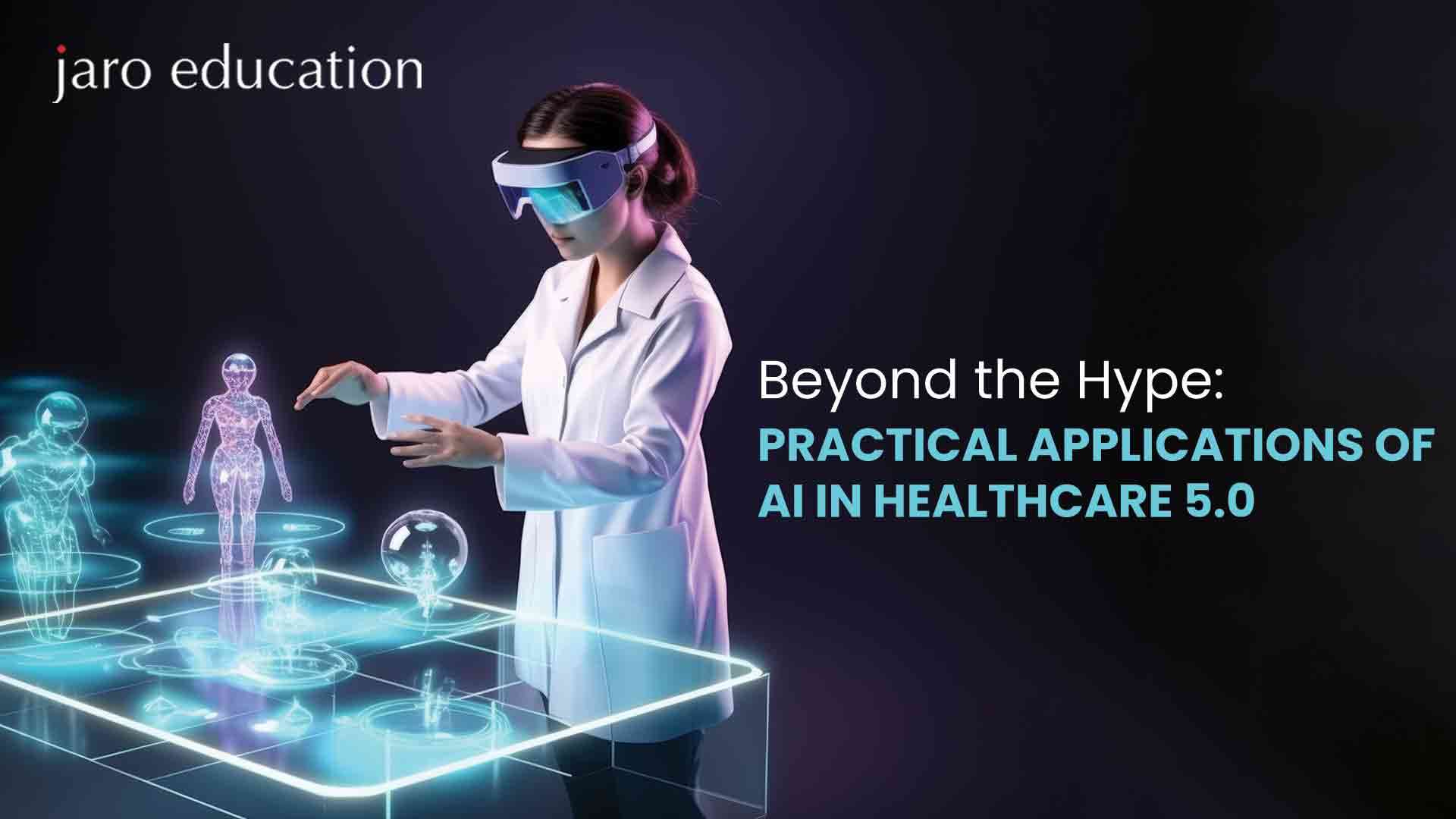
- jaro education
- 28, May 2024
- 10:43 am
The role of AI in Healthcare is the talk of the town today. According to Statista, the AI healthcare market, which was valued at $11 billion in 2021, is projected to be worth $187 billion in 2030. In the ever-evolving landscape of healthcare, technological advancements have consistently reshaped the way we approach patient care and industry practices. Now, with the advent of Industry 5.0, a new era marked by the convergence of human expertise and technological prowess, the potential for transformative change in healthcare has never been more promising. At the forefront of this revolution stands artificial intelligence (AI), poised to revolutionize healthcare delivery, streamline clinical workflows, and drive innovation across the industry.
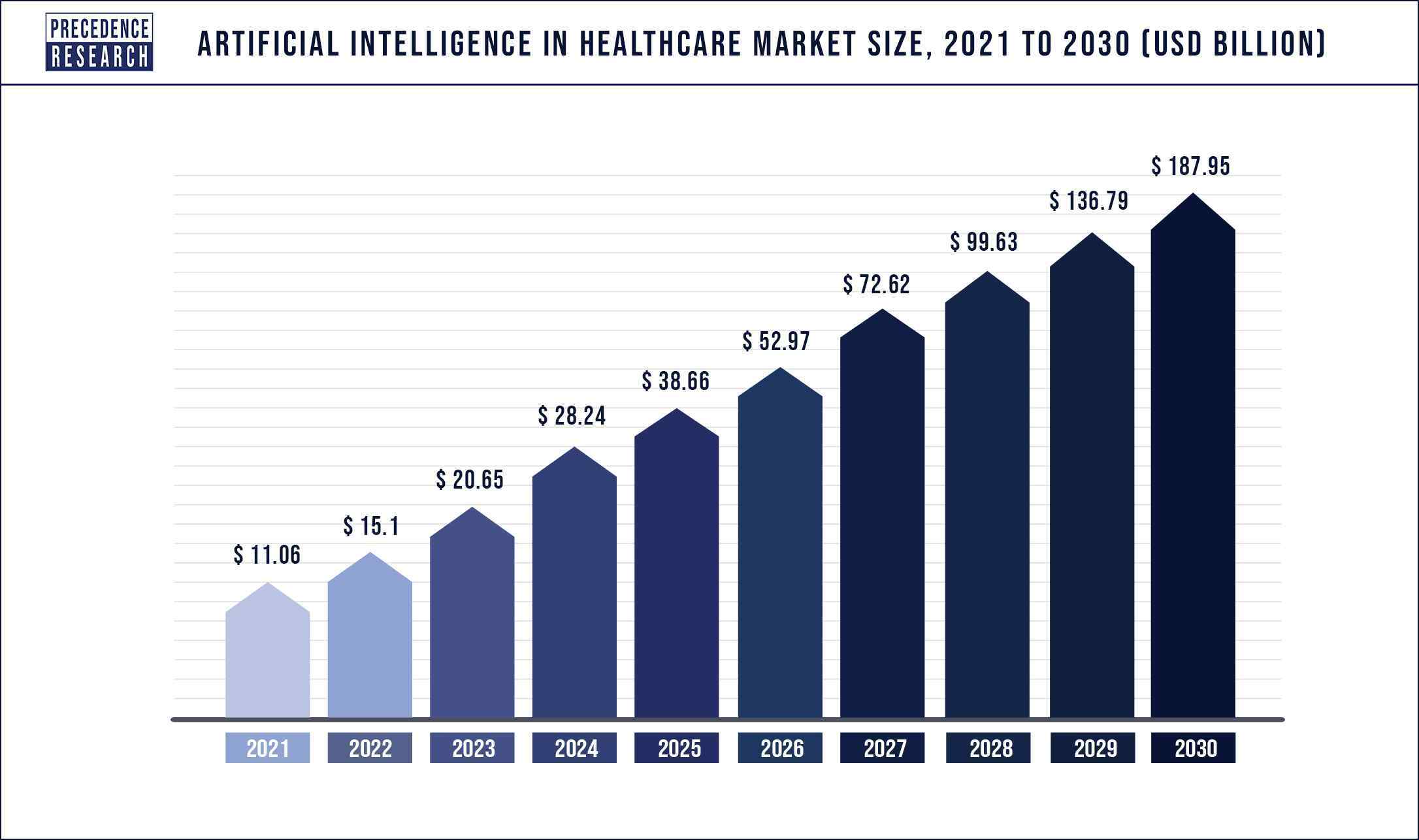
As we embark on this journey towards a future where the role of AI in healthcare is central, it becomes imperative for professionals to equip themselves with the necessary skills and knowledge to harness their full potential. This is where the Executive Programme in Healthcare for Industry 5.0, offered by CEP, IIT Delhi, emerges as a beacon of opportunity. Designed to empower healthcare professionals with practical insights into AI in healthcare, this programme serves as a gateway to unlocking the transformative power of AI in revolutionizing patient care.
The exponential growth of the healthcare AI market further underscores the significance of embracing AI in healthcare. With projections indicating a substantial increase in market size and a corresponding impact on patient care and industry innovation, the time to embrace AI-driven solutions is now. By leveraging AI in healthcare, organizations can enhance diagnostic accuracy, personalize treatment plans, and improve patient outcomes, thereby revolutionizing the way they deliver healthcare services.
As we delve deeper into the transformative potential of AI in healthcare, let us explore how the Executive Programme in Healthcare for Industry 5.0 by CEP, IIT Delhi, is shaping the future of healthcare professionals by equipping them with the tools and knowledge to navigate this exciting frontier. Join us on this journey as we unravel the possibilities of AI in revolutionizing healthcare under the framework of Industry 5.0.
Understanding the Role of AI in Healthcare 5.0
In the dynamic landscape of Healthcare 5.0, artificial intelligence (AI) stands as a cornerstone, promising to revolutionize the way we deliver and experience healthcare. To grasp the full scope of AI’s impact in this paradigm shift, it’s essential to first understand its foundational concepts and how they intersect with the healthcare industry.
At its core, the role of AI in healthcare encompasses a diverse array of technologies and methodologies aimed at replicating human-like intelligence in machines. Under the framework of Industry 5.0, AI serves as a catalyst for innovation, driving transformative changes across various sectors, including healthcare.
Within the realm of AI in healthcare, several subfields play a pivotal role in shaping its applications. Machine learning, for instance, enables computers to learn from data and improve their performance over time without explicit programming. Natural language processing (NLP) empowers machines to understand and interpret human language, facilitating tasks such as medical transcription and patient interaction. Additionally, computer vision enables machines to perceive and analyze visual data, opening up avenues for image-based diagnostics and surgical assistance.
The role of AI in healthcare is as diverse as it is impactful. One of its most significant contributions lies in enhancing diagnostic accuracy by leveraging vast datasets to identify patterns and anomalies that may elude human perception. From detecting early signs of disease to predicting treatment responses, AI-driven diagnostic tools hold the potential to revolutionize clinical decision-making and improve patient outcomes.
Beyond diagnostics, AI also streamlines administrative processes, reducing the burden of paperwork and bureaucracy on healthcare professionals. Tasks such as medical coding, billing, and patient scheduling can be automated with AI, freeing up valuable time and resources that can be redirected toward patient care.
Moreover, AI in healthcare enables personalized patient care by analyzing individual patient data and tailoring treatment plans to meet their specific needs and preferences. From recommending personalized treatment regimens to predicting disease progression based on genetic profiles, AI-driven insights empower healthcare providers to deliver more precise and effective care.
As we delve deeper into the role of AI in Healthcare 5.0, it becomes clear that its potential to enhance diagnostic accuracy, streamline administrative processes, and personalize patient care is unparalleled. By harnessing the power of AI in healthcare, we can unlock new frontiers in healthcare delivery and usher in an era of proactive, patient-centric care.
Real-world Applications of AI in Healthcare
The transformative potential of AI in healthcare is not merely theoretical; it is being realized through a multitude of real-world applications across various domains within the healthcare industry. These applications exemplify how AI is revolutionizing patient care, optimizing clinical workflows, and driving innovation in healthcare delivery.
Diagnostics, the cornerstone of effective healthcare, has been significantly enhanced by AI-driven innovations. Case studies abound of AI algorithms outperforming human experts in tasks such as medical imaging analysis. For instance, in the field of radiology, AI-powered image recognition systems have demonstrated remarkable accuracy in detecting abnormalities in medical scans, including X-rays, MRIs, and CT scans. By augmenting the diagnostic capabilities of healthcare professionals, these AI-driven solutions enable earlier detection of diseases, such as cancer and cardiovascular conditions, leading to more timely interventions and improved patient outcomes.
Beyond diagnostics, AI in healthcare is transforming treatment planning by providing personalized insights tailored to individual patient profiles. For instance, in oncology, AI algorithms analyze genomic data to identify specific genetic mutations that may influence treatment responses. By predicting the efficacy of different treatment options based on genetic markers, AI empowers oncologists to personalize treatment regimens and optimize therapeutic outcomes for cancer patients.
In the realm of patient monitoring, AI-powered technologies offer continuous, real-time insights into patient health status, enabling proactive interventions and timely care delivery. Wearable devices equipped with AI algorithms can track vital signs, monitor activity levels, and detect early warning signs of health deterioration. By analyzing streams of physiological data, AI-driven monitoring systems facilitate remote patient monitoring, reducing the need for hospital admissions and improving patient engagement in self-care.
Administrative tasks, notorious for their complexity and inefficiency, are also being streamlined through AI-driven solutions. Case studies demonstrate how AI-powered chatbots and virtual assistants are revolutionizing patient interactions, providing personalized responses to inquiries, scheduling appointments, and facilitating medication reminders. Moreover, AI-driven solutions automate medical coding, billing, and claims processing, reducing administrative burden on healthcare providers and improving revenue cycle management.
The impact of AI-driven innovations on healthcare outcomes is profound, with studies showing significant improvements in patient outcomes, reductions in healthcare costs, and increases in operational efficiency. By harnessing the power of predictive analytics and clinical decision support systems, healthcare organizations can make data-driven decisions, optimize resource allocation, and deliver evidence-based medicine at scale.
Overcoming Challenges and Ethical Considerations
While the potential role of AI in healthcare is undeniable, its widespread adoption is not without challenges and ethical considerations. As we navigate the integration of AI in healthcare settings, it’s crucial to address these hurdles and ensure responsible deployment to safeguard patient privacy, uphold ethical standards, and mitigate risks.
One of the foremost challenges in the adoption of AI in Healthcare is data privacy concerns. Healthcare organizations handle vast amounts of sensitive patient data, raising questions about data security, confidentiality, and compliance with privacy regulations such as HIPAA (Health Insurance Portability and Accountability Act). To address these concerns, healthcare organizations must implement robust data protection measures, including encryption, access controls, and data anonymization techniques, to safeguard patient privacy and ensure compliance with regulatory requirements.
Regulatory compliance poses another challenge, as AI in healthcare solutions must adhere to stringent regulatory standards to ensure safety, efficacy, and legal compliance. Regulatory bodies such as the FDA (Food and Drug Administration) and EMA (European Medicines Agency) play a crucial role in evaluating and approving AI-driven medical devices and software applications. Healthcare organizations must navigate complex regulatory landscapes, obtain necessary approvals, and adhere to regulatory guidelines to ensure the safe and ethical use of AI in healthcare.
Interoperability issues also hinder the seamless integration of the role of AI in healthcare ecosystems, as disparate systems and data silos inhibit the free flow of information and hinder data sharing and collaboration. Standardization efforts, interoperability frameworks, and interoperability solutions such as FHIR (Fast Healthcare Interoperability Resources) are essential to overcoming interoperability challenges and facilitating data exchange between healthcare systems, devices, and applications.
In addition to technical challenges, ethical considerations surrounding the use of AI in patient care must be addressed to ensure responsible deployment and mitigate risks. Bias in AI algorithms, for instance, can perpetuate disparities in healthcare outcomes if left unchecked. Algorithms trained on biased or incomplete data may produce biased results, leading to disparities in diagnosis, treatment, and patient outcomes. To address algorithmic bias, healthcare organizations must prioritize diversity and representativeness in training data, implement bias detection and mitigation techniques, and ensure transparency and accountability in AI decision-making processes.
Transparency and accountability are also critical ethical considerations in AI deployment, as healthcare providers and patients must understand how AI algorithms make decisions and who is responsible for their outcomes. Explainable AI (XAI) techniques, such as model interpretability and transparency tools, enable healthcare professionals to understand and interpret AI-driven decisions, fostering trust and confidence in AI-powered solutions.
To mitigate risks and ensure responsible AI deployment in healthcare settings, healthcare organizations must adopt a holistic approach that addresses technical, regulatory, and ethical considerations. By implementing robust data privacy measures, adhering to regulatory standards, overcoming interoperability challenges, and addressing ethical considerations, healthcare organizations can harness the transformative potential of AI while safeguarding patient privacy, upholding ethical standards, and delivering high-quality care to patients.
Leveraging AI for Future Healthcare Innovation
As we look toward the future of healthcare, the role of AI in healthcare looms large, promising transformative changes that will revolutionize the industry. In this section, we delve into the future outlook of AI in healthcare and explore its potential to drive innovation, enhance patient care, and shape the future of healthcare delivery.
The future of the role of AI in healthcare holds immense promise, with emerging trends and research areas poised to redefine the way we approach healthcare delivery and patient outcomes. One such trend is precision medicine, which leverages AI and genomic data to tailor treatment plans to individual patient profiles, improving treatment efficacy and patient outcomes. Additionally, digital therapeutics, powered by AI algorithms and mobile technology, offer novel approaches to managing chronic conditions and delivering personalized interventions to patients outside traditional clinical settings. Population health management, another emerging area, harnesses AI-driven analytics to identify high-risk patient populations, optimize resource allocation, and implement targeted interventions to improve health outcomes at the population level.
In conclusion, the future of healthcare is intrinsically linked to the transformative potential of AI. By embracing AI as a tool for driving innovation, enhancing clinical decision-making, and improving patient care, healthcare professionals can usher in a new era of healthcare delivery that is more efficient, effective, and patient-centric. However, it is essential to move beyond the hype surrounding AI in healthcare and understand the tangible benefits and challenges associated with its adoption. By remaining vigilant about ethical considerations, addressing regulatory concerns, and continuously educating themselves on AI-driven advancements, healthcare professionals can leverage AI in healthcare to its fullest potential and shape the future of healthcare delivery for the better.
We invite healthcare professionals to enroll in the Executive Programme in Healthcare for Industry 5.0 by CEP, IIT Delhi, to gain practical insights and skills in leveraging AI for healthcare transformation. By participating in this program, you will equip yourself with the knowledge and expertise needed to navigate the AI-driven future of healthcare and drive positive change in your organization and beyond.
Additionally, we encourage readers to explore further resources and engage in ongoing discussions on the practical applications of AI in Healthcare 5.0. By staying informed and empowered, you can play an active role in shaping the future of healthcare delivery and improving patient outcomes in the AI-driven era.







